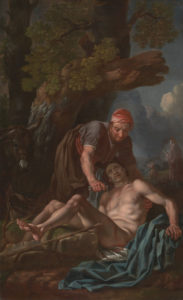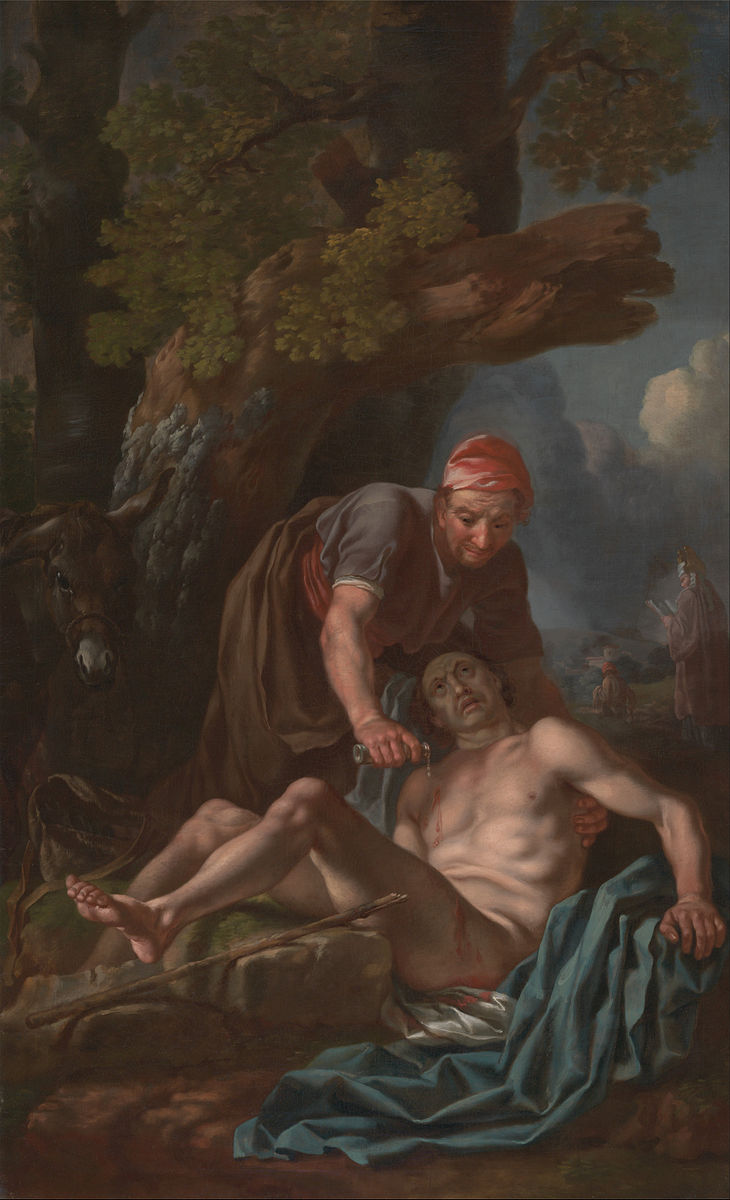
“The Miracles at Hand” on The Good Samaritan
Blessed are the merciful, for they will receive mercy (Matthew 5:7).
In his sermon, “The Miracles at Hand” (The Magnificent Defeat, pp.136-144), Frederick Buechner offers a compassionate reading of Jesus’ greatest parable on compassion, “The Good Samaritan” (Luke 10:25-37). The following is an excerpt from my book, Blessed at the Broken Places: Reclaiming Faith and Purpose with the Beatitudes (pp.77-79) in which I comment upon Buechner’s reading of the parable and offer his concluding words.
In “The Miracles at Hand,” a meditation on the Parable of the Good Samaritan, Frederick Buechner offers neither a diatribe about the hypocrisy of the pious who show no mercy nor a hymn of praise to the good souls who habitually engage in random acts of kindness. Rather, he discusses perception. He explores how priest, Levite, you, and I – all good people – simply can’t see the half-dead, helpless man on the side of the road because he defies our expectations and doesn’t fit our agendas in our hurry from this place to the next. More to the point, we don’t feel compassion because we have our problems and he, his, and best of luck to him – surely someone will come along. We fail to act in mercy not because we are up to no good but because we are up to much good, much that will help the company or the family or even the church or the poor, so we fail to hear the call to merciful action shouted at us in the silence of the unconscious, naked, brutalized man.
How then did the Samaritan rise above this? Why did the Samaritan see while the priest and Levite did not? Nobody knows, but I can venture an educated guess. People in post-exilic Israel deemed Samaritans a tainted race, half-bred imposters to the north whose claim to the covenant promises of God insulted the people of Ezra and Nehemiah, the followers of Pharisee and Sadducee. From the perspective of Anglos in America, of whom I am one, the Samaritans were the people of color, the descendent of the slave or the undocumented immigrant, here out of desperation originally but here with equal dignity then and now, quietly taking a place at the table that we too often forget God set not for us alone but for all.
Many in Jesus’ audience likely had no compassion, only contempt for the Samaritan. Yet, the Samaritan had compassion. He seemed to understand something that the keepers of the boundaries and rules do not. I suspect that he understood that we are all on this road together, all vulnerable under threat of abandonment, so that with the perils on our journeys, we need each other. He saw the scene as God saw it, as a predicament between two family members, not between two aliens or enemies. One lay beaten almost to death, exposed, penniless, and helpless. The other, the Samaritan, traveled alone in hostile territory. At the end of the day, they shared a common fate, a common vulnerability. Recognizing this, the Samaritan saw a brother, regardless of more superficial differences. This sense of shared suffering and destiny is compassion, which means, “suffering with,” and from compassion, mercy springs.
In that spirit, Buechner writes with his own uncanny compassion not only for the victim on the side of the road but for the “blind men,” as he calls them, who just don’t see him, just miss the call to merciful action. Missing this call brings tears to the eyes not only for the beaten, robbed victim but for the passers-by because they are really missing their own lives, the deepest joy to which God calls them, the joy of being merciful as God is merciful. Buechner elaborates:
As we travel around this world, this life, every man that we meet is the man in the ditch because every man that we meet, no matter how little he looks it and no matter how surprised he might be to realize it, is half dying for need of us…In one way or another, every human being is crying out or acting out, or at great cost stifling, his need to be known, accepted, forgiven and healed by us of all people. So that other self who looks so distinct from ourselves is not quite so distinct after all because he cannot really even be a self without us. To be really alive, not just half alive, he needs our help, our healing.
There seems to be a deeper and more terrible truth still, because to be really alive, not just half alive, we need to help and heal him: his need for mercy is matched by our need to be merciful…Neither of us can be really human, really alive, without the other; and every time we pass him by and leave him to his own misery, we both suffer for it. We need each other so infinitely more than we are usually apt to see or to admit that we see….
Your life and my life flow into each other as wave flows into wave, and unless there is peace and joy and freedom for you, there can be no real peace or joy or freedom for me…[T]here can really be life only when there is, in just this sense, love (from Frederick Buechner’s, “The Miracles at Hand,” The Magnificent Defeat, pp. 141-143),
Related Posts
The Greatest Commandment, The Good Samaritan, and Love’s Paradox
Frederick Buechner: Putting Color Back on the Cheeks of Grace
Two Books on Telling for Those Who Mourn
Clay Jars and Peculiar Treasures: Saints in Buechner’s Writings
Vocation: Your Deep Gladness Meets the World’s Deep Hunger
Image: The Good Samaritan: Francis Hayman, 1708-1776, public domain, Wikimedia Commons.


I believe that other awareness begins with self-awareness. Too few of us are self-aware. The Samaritan was self-aware to the point he saw the man by the side of the road hurt. We do not see them because in our hurry to the next thing that we think will make us better or aid us, we do not see the self that is lying, injured.
Thank you, Mike. I, the psychologist, had not previously seen the parable from that psychological perspective. Your point broadens the applicability of the parable to include self-compassion. Moreover, it adds to our understanding of how the Samaritan had such exquisite compassion for the man in the ditch. I wlll ponder your point for some time.